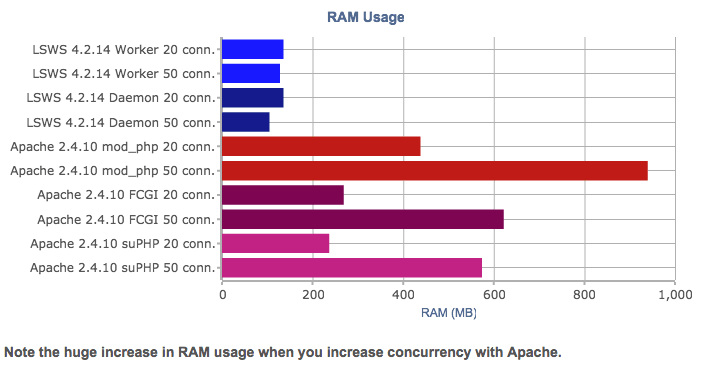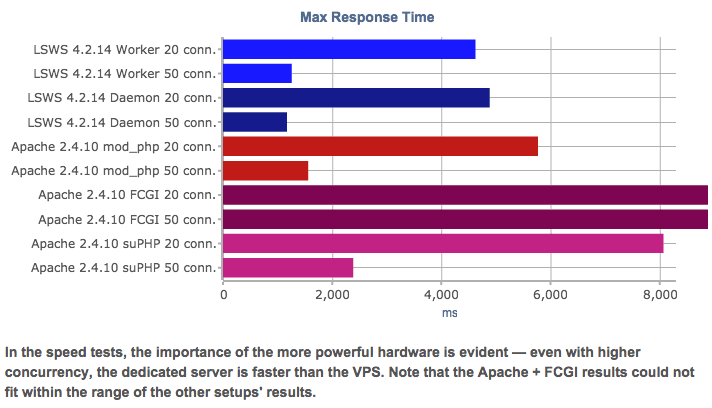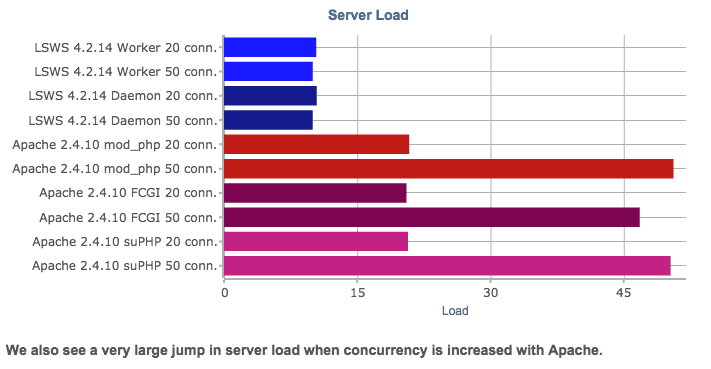Benchmarks: LiteSpeed vs. Apache with cPanel + WordPress
 These benchmarks from cPanel Conference 2014 demonstrate RAM usage and server load differences for LiteSpeed Web Server vs. Apache.
These benchmarks from cPanel Conference 2014 demonstrate RAM usage and server load differences for LiteSpeed Web Server vs. Apache.
“Real” benchmarks
One common complaint about benchmarks is that they do not show real world results. In our opinion, benchmarks are not meant to mimic the real world. We think they should highlight pure differences in web server speeds, with as little clouding by other parts of the stack as possible. (If you want real world results, check out our case studies.)
But Tristan Wallace, cPanel’s PHP guru, wanted benchmarks that would look more like something a cPanel user might be running. For cPanel Conference this year, she tested the difference LSWS would make on a WordPress + cPanel installation, looking at not only speed, but also RAM and load.
%27%20fill-opacity%3D%27.5%27%3E%3Cellipse%20fill%3D%22%23c76887%22%20fill-opacity%3D%22.5%22%20rx%3D%221%22%20ry%3D%221%22%20transform%3D%22matrix(117.07601%2033.36891%20-16.18706%2056.79286%20220.2%20115.1)%22%2F%3E%3Cellipse%20fill%3D%22%23fff%22%20fill-opacity%3D%22.5%22%20rx%3D%221%22%20ry%3D%221%22%20transform%3D%22matrix(32.47822%20259.19061%20-53.00824%206.64227%2037%20152.6)%22%2F%3E%3Cellipse%20fill%3D%22%23fff%22%20fill-opacity%3D%22.5%22%20rx%3D%221%22%20ry%3D%221%22%20transform%3D%22matrix(192.17967%2021.8961%20-7.69848%2067.56872%20428.7%203.8)%22%2F%3E%3Cellipse%20fill%3D%22%2396a2df%22%20fill-opacity%3D%22.5%22%20rx%3D%221%22%20ry%3D%221%22%20transform%3D%22rotate(-129.6%2089.6%20-21.6)%20scale(40.55045%2054.56787)%22%2F%3E%3C%2Fg%3E%3C%2Fsvg%3E) You can’t handle the traffic
You can’t handle the traffic
Tristan’s benchmarks (above and below) look at LSWS and Apache at two levels of concurrency. They show a stark difference in scalability. When the number of concurrent connections was increased (from 20 to 50), Apache’s RAM usage and server load exploded. For LSWS, it remained virtually unchanged. This is the main point of LiteSpeed: It cuts load on high traffic servers. . It allows you to serve more traffic (or host more accounts) without upgrading your server.
Unfortunately, the two different concurrency levels were tested on separate machines — a small VPS for 20 concurrent connections and a dedicated server for 50 concurrent connections. The reason this was done, though, just underscores the points above: when Tristan tried to run the higher concurrency test on the VPS, Apache just couldn’t handle. LiteSpeed Web Server, on the other hand, it just kept chugging along.
This difference in hardware means, though, that the speed benchmark (looking at max response time) doesn’t give us a good picture of what happens to speed when concurrency is increased. We do see that LSWS is faster than Apache (especially for Apache’s FCGI and suPHP setups), but the real difference happens when there’s a traffic spike and Apache can’t handle the traffic.
Reactions requested
These benchmarks are perhaps not perfect (What benchmarks are?), but they shine light on an important real world problem: What happens when Apache gets too much traffic. The full presentation and more notes are available on our site. We’ve created a thread on our forum to discuss these benchmarks and we welcome any feedback you may have.

 You can’t handle the traffic
You can’t handle the traffic
Comments